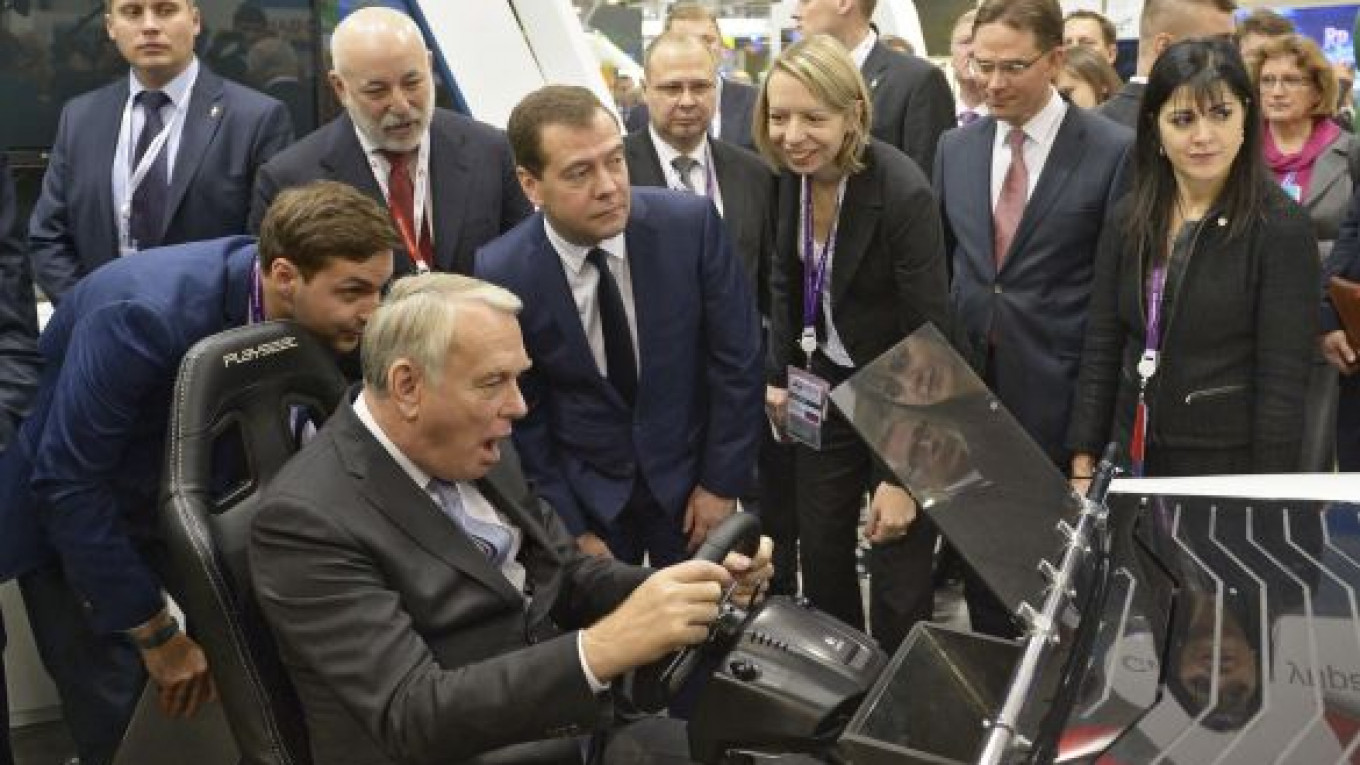Good infrastructure, a secure environment and exponentially increasing computer power guarantee the growth of innovative solutions to global problems, political and technology leaders told attendees of the International Forum for Innovative Development in Moscow on Thursday.
Russia has the intellectual capital, education and state support to become a technology leader, said Peter Diamandis, an American engineer, physician and entrepreneur. Diamandis, a keynote speaker at the Open Innovations Forum, is the founder and chairman of the X Prize Foundation, whose mission is to bring about radical breakthroughs for the benefit of humanity.
By 2023, an average computer will have the speed at which the human brain does visual and auditory processing, and 25 years later it will have the computation ability of the entire human race, Diamandis said.
Companies need to embrace this reality, because "this is what is going to drive innovation like never before," Diamandis said. "Innovation is the process by which we share ideas. And this is how you solve problems."
Prime Minister Dmitry Medvedev, speaking at the forum, reassured the audience about the government's commitment to support innovation and research.
"We tried to use the best of foreign, including Finnish and French, experience in forming our own innovation infrastructure, and a large amount of money has been invested. But it is important to make sure that each element of this infrastructure solves a clearly defined task … on all stages of the innovation cycle," Medvedev said.
His Finnish counterpart, Prime Minister Jyrki Katainen, who was also present, stressed the importance of creating the type of surroundings in which people can meet and share experiences. "Success is driven by knowledge," he said.
The Prime Minister of France, Jean-Marc Ayrault, also said that the role of the government was to provide a secure environment to facilitate scientific research. But if research is not turned into real technology, the effort is wasted, he added.
The presence of high-level officials led to the usual security precautions and entry screening, while the Federal Guards Service issued high-tech proximity cards to all those who successfully ran their gauntlet. Despite the expected advances in computing spoken of at the event, the participant database lacked full information on all attendees and some representatives of the press and even event sponsors were denied entry.
The thousands of participants who did make it in heard from a wide range of global experts, including Stephen Oesterle, a senior vice president at medical technology firm Medtronic, who said that medicine was one of the areas where Russia was expected to excel.
"Unlike pharmaceuticals, medical devices are not discoveries. They are inventions," Oesterle said in an interview on the sidelines of the forum.
"It starts at a bedside with thoughtful physicians, who think of better ways they could help a patient — you have such physicians. Then, it needs thoughtful engineers — you have very good engineers as well. And you have pockets of very excellent software engineers. Then you need technical universities. And you have them too. So, what is missing?" Oesterle said.
"I believe it is two things," he continued. "First, there has not been enough risk capital available in this part of the world. Second, for many years, your country has not had a culture of entrepreneurship and innovation. There are not many role models in this industry in Russia. But I see it changing. With capital and young leaders, you will have the set."
Russian people need to believe in themselves, said Konstantin Fokin, chief executive of the Innovation Development Center of Moscow, which represented the Moscow government at the event. When foreigners see Russian people projecting confidence in what they do, they also want to be a part of what is happening in our country, he added.
Contact the author at g.moukine@imedia.ru
A Message from The Moscow Times:
Dear readers,
We are facing unprecedented challenges. Russia's Prosecutor General's Office has designated The Moscow Times as an "undesirable" organization, criminalizing our work and putting our staff at risk of prosecution. This follows our earlier unjust labeling as a "foreign agent."
These actions are direct attempts to silence independent journalism in Russia. The authorities claim our work "discredits the decisions of the Russian leadership." We see things differently: we strive to provide accurate, unbiased reporting on Russia.
We, the journalists of The Moscow Times, refuse to be silenced. But to continue our work, we need your help.
Your support, no matter how small, makes a world of difference. If you can, please support us monthly starting from just $2. It's quick to set up, and every contribution makes a significant impact.
By supporting The Moscow Times, you're defending open, independent journalism in the face of repression. Thank you for standing with us.
Remind me later.


